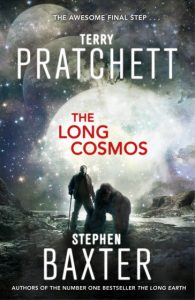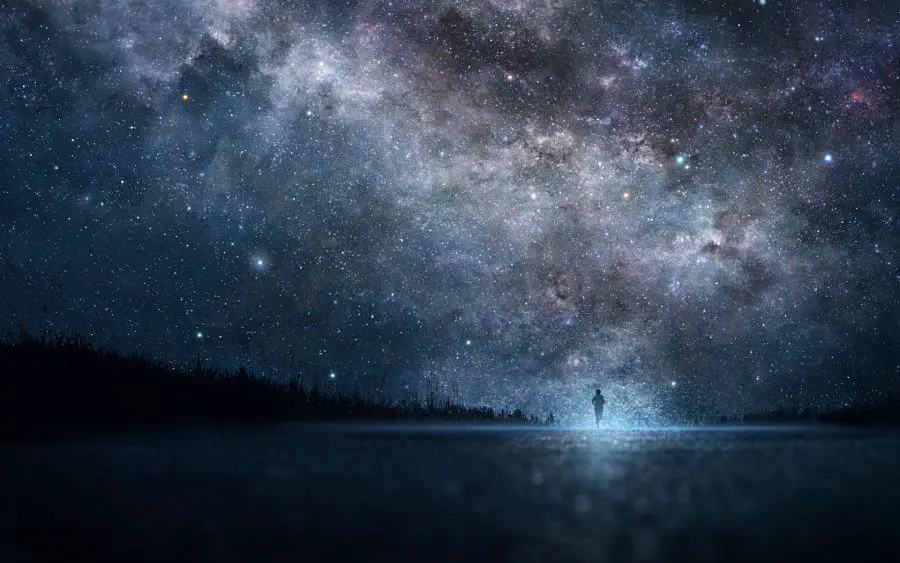The Long Cosmos
Terry Pratchett and Stephen Baxter
HarperCollins
Release Date: June 14, 2016
ISBN 978-0-06-229737-2
I will admit a bit of trepidation in agreeing to review The Long Cosmos, the fifth and concluding book in the internationally best selling Long Earth series, penned by venerated authors Terry Pratchett and Stephen Baxter. Not only had I not read any of the first four books of the series, but I have not (abashedly) read anything of Mr. Baxter’s, and only a few works by Mr. Pratchett (only enough to say I have made his acquaintance, not that I “know” him). Yet how could I let that keep me from diving in?
I need not have worried. Yes, there were times that characters were introduced with histories alluded to of which I knew nothing, but that did not take away from the story I read. Nor did my understanding suffer from a not knowing what had come before.
The year is 2070. It’s been almost 60 years since Step Day, when millions of “stepper boxes” were activated (after instructions on how to build them for almost no cost appeared on the internet), allowing for virtually instantaneous travel between parallel worlds in a vast, consistent multiverse. Before Step Day, very few humans possessed a natural ability for stepping – now, anyone can easily do it. In the decades since Step Day, myriads of alternate worlds have been visited, colonized and utilized, and mankind – as well as other sentient beings – fled a traumatized Earth (known as Datum Earth) for the freedom and the challenges of other Earths, known collectively as Long Earth.
But now, a mysterious message has been broadcast throughout all of Long Earth, transmitted in many languages, including those of non-humans. The origin of the broadcast is unknown, but the message is simple: JOIN US.
In an attempt to find the location of the broadcasters, and facilitate interaction with whatever beings sent the message, a group of highly evolved, highly intelligent beings known as the Next look beyond the simple message and discover what appears to be blueprints for building an immense and vastly advanced form of artificial intelligence. Calling this alien AI, simply, the Machine, they begin work on its construction.
Meanwhile, Joshua Valienté, a veteran “natural” stepper now nearing 70 years old, decides to take a final walkabout across the various worlds of Long Earth. Things start off well, but on Earth West 1,520,875, he gets trampled by an elephant-like creature, and would most likely have died had it not been for the intervention of a troll (think: gorilla), one of a species of sentient creatures found across Long Earth, who communicate through song. The troll, who Joshua nicknames Sancho, takes the traveler back to his band where they care for him through a rather dicey convalescence. During this time, Joshua observes the trolls, surprised at how sophisticated their society truly is.
There are other plot lines in The Long Cosmos as well, such as the man searching for his newly discovered grandson, lost in a mysterious stepping incident with an otherworldly creature known as a Traverser, shortly after meeting the boy for the first time. A sojourn to find the missing avatar of the AI being who was first a Zen motorcycle repairman, but became so much more. The stories of some of the people drawn to the Machine in an almost “Close Encounters” way, including a ten year old ward of the state (of Datum Earth) who can see sweeping mathematical patterns as easily as we see type on a page.
How all these stories develop, wind together, and eventually end up in the same place is like experiencing a beautiful and mesmerizing dance. Bittersweet, too, as Terry Pratchett died in 2015 after suffering from early-onset Alzheimer’s disease, leaving Mr. Baxter to fill in the missing pieces and lovingly follow through with editorial and publishing phases of the book. But the writing is seamless, the worlds traveled both strange and familiar (and often humorous), the fantastical elements normalized by having become common.
It’s a kind of wonderland, this Long Earth, this Long Cosmos. You have a world with islanders who live, not on emergent land, but on the exposed portions of huge, mostly submerged creatures, who open their mouths to give the humans safe harbor during tropical storms. You have a world with trees more than a mile high and as big around as a building, where the leaves don’t drop but float away in the sky – and no fairy tales here; the “science” behind such a thing occurring is part of the exploration. You have the gorilla-like trolls, indigenous to many of the Long Earths, with their oldest members acting as “librarians” for the various tribes, maintaining their myriad histories in memory, shared in song.
The devastation of Datum Earth, the political and social maneuverings of the Next and the military, the interpersonal baggage that many of the characters lug around – these “familiar” things keep us grounded to what we know, but seem almost bland and colorless next to all the possibilities in the other Earths – which is probably part of the point. Humanity is humanity, no matter how far we step through other worlds. But we learn and adapt, too. And sometimes, when we’re ready, we look beyond ourselves.
The Long Cosmos is an engaging read; probably more so if you read the entire series. But even on its own, it’s a great read: mind-boggling, poignant, gripping, funny, and rewarding. If you’ve read the other books in the Long Earth series, you’re bound to enjoy this final volume. If you’ve not read any, know that you will still enjoy this one immensely, on its own, and it will definitely pique your imagination.
~ Sharon Browning


